Pets And Citronella Geraniums – Is Citronella Toxic To Pets


Sign up for the Gardening Know How newsletter today and receive a free copy of our e-book "How to Grow Delicious Tomatoes".
You are now subscribed
Your newsletter sign-up was successful
Citronella geraniums (Pelargonium cv. ‘Citrosa’) are popular patio plants that are purported to ward off pesky insects such as mosquitoes, although no scientific evidence supports this claim. Is citronella safe for pets? If you grow scented geraniums in the Pelargonium family, be sure to keep your dogs and cats away. Scented geraniums are toxic to pets.
Citronella Geranium Poisoning in Dogs and Cats
Citronella geraniums have deeply lobed, green leaves and small pinkish or lavender flowers that grow on multiple stems. They grow 2 to 3 feet (61-91 cm.) tall and thrive in sunny situations.
When crushed, the “mosquito” plant’s leaves smell like citronella, an essential oil cultivated from lemongrass varieties. Oil of citronella, which is a naturally occurring insect repellent, is a main ingredient in many pesticides.
Many people plant the geranium in containers on the patio or places where people congregate, hoping to repel mosquitoes. It is important to keep the containers away from curious cats and dogs who might decide to taste the plant, especially if you grow them indoors where your pets are.
Dogs or cats who rub up against the plants may experience dermatitis-- a skin irritation or rash. According to the ASPCA, eating the plants could cause gastrointestinal upset such as vomiting. Cats and dogs also could experience muscle weakness, loss of muscle coordination, depression, or even hypothermia if enough of the plant is ingested. Cats are most susceptible.
If you suspect your dog or cat ingested a toxic substance or it shows any of these symptoms, call your veterinarian right away.
Sign up for the Gardening Know How newsletter today and receive a free copy of our e-book "How to Grow Delicious Tomatoes".

After graduating from Oklahoma State University with a degree in English, Susan pursued a career in communications. In addition, she wrote garden articles for magazines and authored a newspaper gardening column for many years. She contributed South-Central regional gardening columns for four years to Lowes.com. While living in Oklahoma, she served as a master gardener for 17 years.